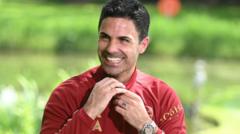Media caption,
‘With that belief, anything can happen’
We have seen him as a player and we know him as a manager, but who is Mikel Arteta?
In the final week of a thrilling Premier League season, the Arsenal manager invited BBC Sport columnist Guillem Balague to his home for an exclusive hour-long interview.
Arteta talks about his childhood, his career, his family life and becoming the manager he is today.
Arteta on his childhood and La Masia
Arteta grew up in the idyllic neighbourhood of Antiguo in San Sebastian.
“I love the water, I love the sun and I love the beach, and you include a football on top of that…” he says.
“That’s where I spent most of the hours of the day, playing on the beach when I was a kid. For me, it was the perfect combination.”
At 14, Arteta met future Spain and Liverpool goalkeeper Pepe Reina on his first day at the Barcelona academy, La Masia. He was room-mates and friends with Barca legends Victor Valdez and Andres Iniesta as teenagers.
“He (Reina) has been one of my best friends,” he says. “We shared our bunk beds for three years. One of the best memories that I have in my life is the time that we spent together.
“We were competing with each other because we had to – because we all wanted to get to the first team – but it was a real sense of family.”
Arteta on PSG ‘shield’ Pochettino
Image source, Getty Images
Image caption,
Arteta (right) moved to France on loan as a teenager
At 17, Arteta moved on loan to Paris St-Germain, where he met Mauricio Pochettino, who became an elder brother figure and good friend.
“Mauricio was like a shield for me – he was protecting me from everything. He was giving me so much confidence,” Arteta says.
“He was playing behind me and then it was like having someone constantly pushing you in your back and coaching you and helping you all the time. I could not find anybody better.”
On his move to PSG, Arteta says: “It was a difficult decision. My dream was to play for Barcelona but at the time I had to be very realistic.”
Arteta on ‘survive or die’ at Rangers
Image source, Getty Images
Image caption,
Arteta, with wife Lorena, received a prestigious Spanish honour – the Royal Order of Isabella the Catholic, for extraordinary services to Spain – at the Spanish Embassy in London on Wednesday
In 2002 Arteta signed a deal to join Rangers, leaving Barcelona.
“I have never seen an atmosphere like this – look how passionate these people are,” says Arteta about his first visit to Rangers, where they were playing PSG in the Champions League.
“Best decision that we made. It was really challenging – completely different football. You have to survive or die.”
During his time at Rangers, Arteta met his future wife Lorena, a life coach, on a trip to San Sebastian. They now have three children together.
“She has changed my life. She has changed my perception about life,” he says.
“We have navigated many, many different situations, some of them fascinating, some of them really difficult.
“I have that feeling with her that we never get bored. I can be sitting there five hours, 10 hours, go anywhere in the world and enjoy and have fun and laugh.
“In our profession we always talk about the protagonist, which is the player or the coach or the manager.
“But what about the person that is next to that one? And without that there is not enough foundations and there is not enough strength for that to be consistent.”
Image source, BBC Sport
Image caption,
Arteta at home with Guillem Balague days before his side face Everton in their final Premier League game of the season, when they still have a chance of winning the title
Arteta on ‘guilt’ over parents’ divorce and ‘disaster’ move
After his time in Scotland, a 24-year-old Arteta moved to Spanish side Real Sociedad in the hope of keeping his family together after his parents said they were getting divorced.
“I felt so guilty. I didn’t know if that was because of me and trying to pursue my dream. I feel very responsible for that,” he says.
“I never felt that it was the right call [to move back to Spain], but I had a duty and I wanted to reconnect my parents and my family again.
“It was a disaster. It never worked in that sense. I never felt connected in any moment.”
Arteta on ‘loving every minute’ at Everton
Arteta joined Everton in 2005 for £2m after a successful spell on loan from Sociedad.
“Straight away, you connect with the team; you connect with the players; you connect with the staff; you connect with the supporters and it flows. And that feeling is needed,” he says.
“You feel confident, you feel excited every morning to get off your bed and go to training. I loved every minute.”
Arteta on ‘unbelievable chemistry’ with Guardiola
Image source, Getty Images
Image caption,
Arteta won five domestic trophies, including two Premier League titles, in three and a half years as Pep Guardiola’s assistant at Manchester City
Shortly after his playing career ended, a 34-year-old Arteta joined Manchester City as Pep Guardiola’s assistant manager.
“We had unbelievable chemistry,” he says.
“The meaning on that eye contact was clear of what we had to do or what we were thinking in that moment.
“It was fascinating to be part of something new.”
Arteta on Arsenal – then and now
Arteta played for Arsenal between 2011 and 2016. When he first joined, he was vocal in a quiet changing room.
He says: “I started to talk and I started to get everybody connected – ‘Come on, let’s do this, guys’. I was so excited.
“I’m going to do everything. I’m going to break every wall here. We have to make this happen.”
He says of approaching retirement: “It was coming to a stage that I was feeling much more interested in the coaching side than the playing side.”
In December 2019 Arteta became Arsenal manager.
“The issue was much deeper. The issue was in our roots. It was all a mess,” he says.
“We need our people. We need to convince them that you are committed and you are willing to take this club to a very different place.”
Arteta planted an olive tree in front of his office, symbolising the club’s age and roots.
He says: “I planted the tree and said, ‘This is my gift. Now you have to look after it. It’s a living thing. You cannot let it die.’
“That tree is the same amount of years at our football club – over 130 years.
“It’s going to be there every single day. You have to look at it and you are all responsible.”
>>> Read full article>>>
Copyright for syndicated content belongs to the linked Source : BBC Sport – https://www.bbc.com/sport/football/articles/c2qvqn03z4vo

















